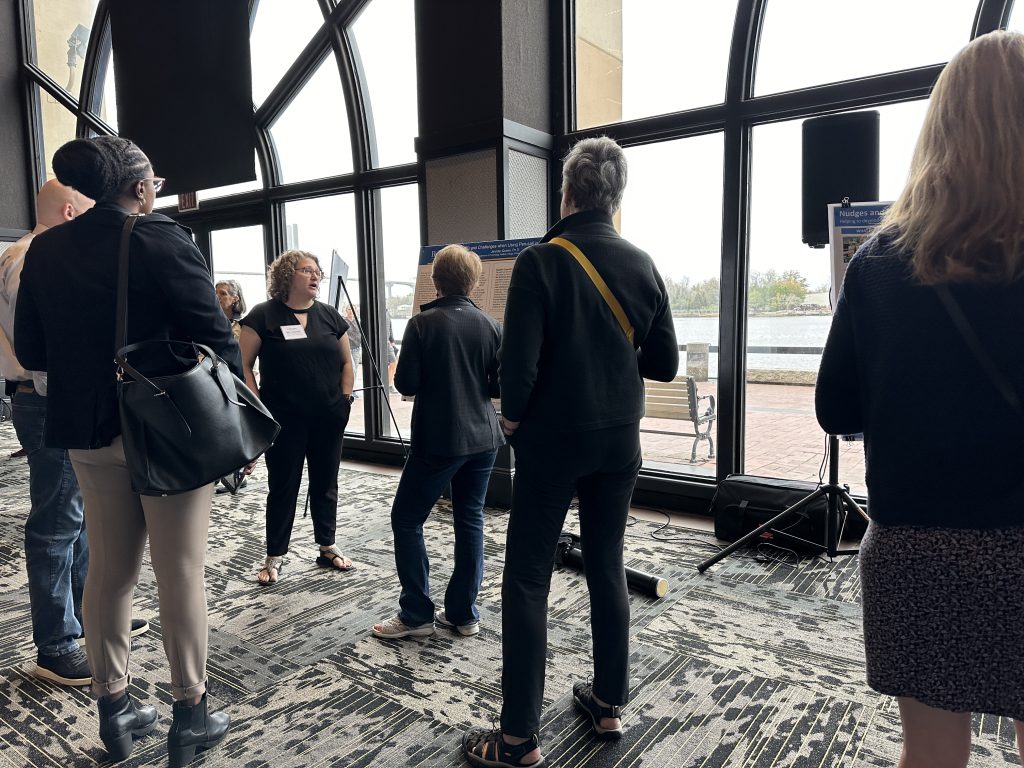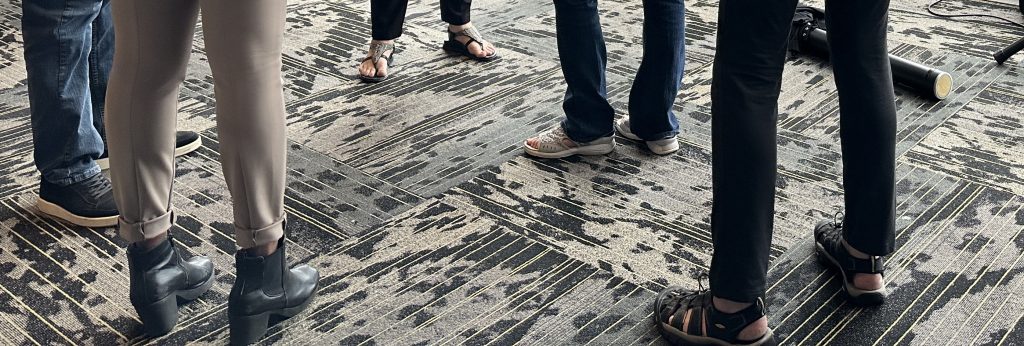By Mattea Garcia
In February, I attended my second Scholarship of Teaching and Learning or SoTL Commons Conference in Savannah, Georgia. Now, if I am being honest, I experience a lot of anxiety attending conferences and recently have decided I need to find the right size and, as my students say, the right vibe. So what is the vibe at SOTL Commons? Curious, warm, enthusiastic, and familiar. People who attend this conference know each other, collaborate throughout the year across institutions and fields, and reconnect each year at this conference. There can sometimes be a sense that you are outside looking in, but once I started asking questions and showing genuine interest in connecting, people were welcoming and eager to share ideas and invite me in. I recall my first visit. I was eager and nervous and felt overwhelmed and out of place. I did not know anything about SoTL and there were times when it seemed everyone else knew each other already. This time around, I promised myself I would attend more sessions, participate actively, and make a connection with at least one new person. That whole pesky communicate with others thing.
SoTL Commons 2024 Insights
Presenters and participants from 90 Institutions (67 institutions outside the State of the Georgia), 5 countries, and 27 US states. More than 75% of presenters and participants were from disciplines outside of the fields of Education and Faculty Development, fields including Engineering, Sciences, and Humanities.
Attendees hailed from a wide array of disciplines from librarianship to chemistry to communication to psychology, converging to discuss our commitment to teaching, share ideas, and, let’s be honest, vent about the challenges we face teaching today. Many of us are grappling with the same challenges in today’s educational climate. Whether it’s integrating new technologies (cough, AI, cough), creating and maintaining inclusive learning environments, or navigating mental health challenges (ours and our students), these tensions are broadly shared by educators. Here at Rollins, we’ve had many conversations about faculty morale and student engagement and those same kinds of discussions were happening at the conference.

I sensed a collective thirst for collaboration and while some groups may be tightly knit, there was an open invitation for all to find a home here. Because this conference is smaller, you can expect sessions to have a good sized audience eagerly participating (most sessions are fairly interactive). There is a shared breakfast and lunch (and snacks!), so you get time to sit with new people and learn from their unique perspectives and experiences. I was grateful to have two of my departmental colleagues and a few other Rollins folks present. We attended sessions together, chatted about what we saw and how to bring it home, and met new people together. Buddying up is a great way to attend one of these conferences.
Something for Everyone
There was a wide array of topics, from spicing up science labs to the use of photonarration as a teaching tool to scoping reviews to assessment to note taking to inclusive teaching. Presenters covered topics related to AI, voice and choice in the development of syllabi and assignments, and the challenges of SOTL research in promotion and tenure. Whether you are a scientist, humanist, librarian, or curious educator, there is something for you to learn and gain by attending. This conference feels like an incubator for educational innovation and collaboration. As Rollins faculty, we are committed to improving our craft, and this is a place where you can find people who are also passionate about teaching and learning. Oh, and you can find more of Nancy Chick’s fan base. It was incredibly entertaining to watch and listen (maybe a bit smugly) to all her adoring fans.
Keynotes Inspire
One highlight of the conference was Dr. Lindsay Wheeler’s Keynote over lunch. A Chemistry professor and the Senior Associate Director of the Center of Teaching Excellence at the University of Virginia, Dr. Wheeler’s talk (and people’s responses to her presence) made it clear that she is a critical force in SoTL, challenging us to see teaching and scholarship as intertwined paths that enrich each other. She dispelled some of the assumptions surrounding SoTL, such as the expectation that all SoTL research must be empirical data. Instead, SoTL benefits from a wide range of disciplinary perspectives and methodologies. Everything from opinion and reflective pieces to conceptual work and data-driven research can find a home in SoTL. The key is to be systematic, aligned, ethical, and transparent. She posed a few questions to inspire SoTL scholars to consider new projects, including: What do you care about? What helps your teaching? Is it interesting or meaningful to you or others? Why does it matter? Whether she meant for it to be or not, her keynote was a call to action to integrate our everyday teaching practices into our scholarship and vice versa. She encouraged us to see the places our teaching and scholarship collide and intersect and expand from each other’s influence.
Nerd Out and Network
Given my newly discovered preference for a smaller conference with a warmer vibe, I also decided to attend the Sunshine State Teaching and Learning Conference here in Orlando. This was an even smaller conference than the Scholarship of Teaching and Learning Commons Conference, with most of the presenters and participants coming from Central Florida. My presentation was entitled “Levels of Difficulty: Helping students learn communication and project planning skills with the support of digital tools and AI.” I had a fair turnout given the time of day and the audience was eager to participate, share ideas, and connect. There was an interesting overlap between the sessions at the Sunshine State and SoTL Commons: assessment, AI, midterm feedback, inclusive teaching, and student voice and choice were all presented and discussed throughout both events. The Sunshine State Teaching and Learning Conference, however, is less about SoTL as an area of research and more about teaching practices and techniques that you can immediately apply to your classrooms. It is a highly interactive conference and presenters are asked to share handouts and slides as well as engage the audience throughout. The vibe? Chill and curious. Again, it is an audience eager to talk about teaching and learn new tools and strategies to enhance student learning.
Both conferences inspired me to consider entry points for SoTL work and to connect with other educators about our daily teaching lives. I encourage other Rollins faculty to do the same and consider attending one or both of these conferences. They hold space for us to nerd out on teaching topics, support each other through the challenges of teaching today, and reinvigorate our shared commitment to teaching and learning. We are passionate and innovative educators who can contribute to and learn from these kinds of teaching and learning conferences. It has been a challenging time to be an educator and it can help to be in community as we grapple with those issues. It brings us back to why we do this work in the first place. These events connect us to others hoping to hone their craft, improve student learning, and prepare for the future of learning. Perhaps the vibe will be right for you, too.

